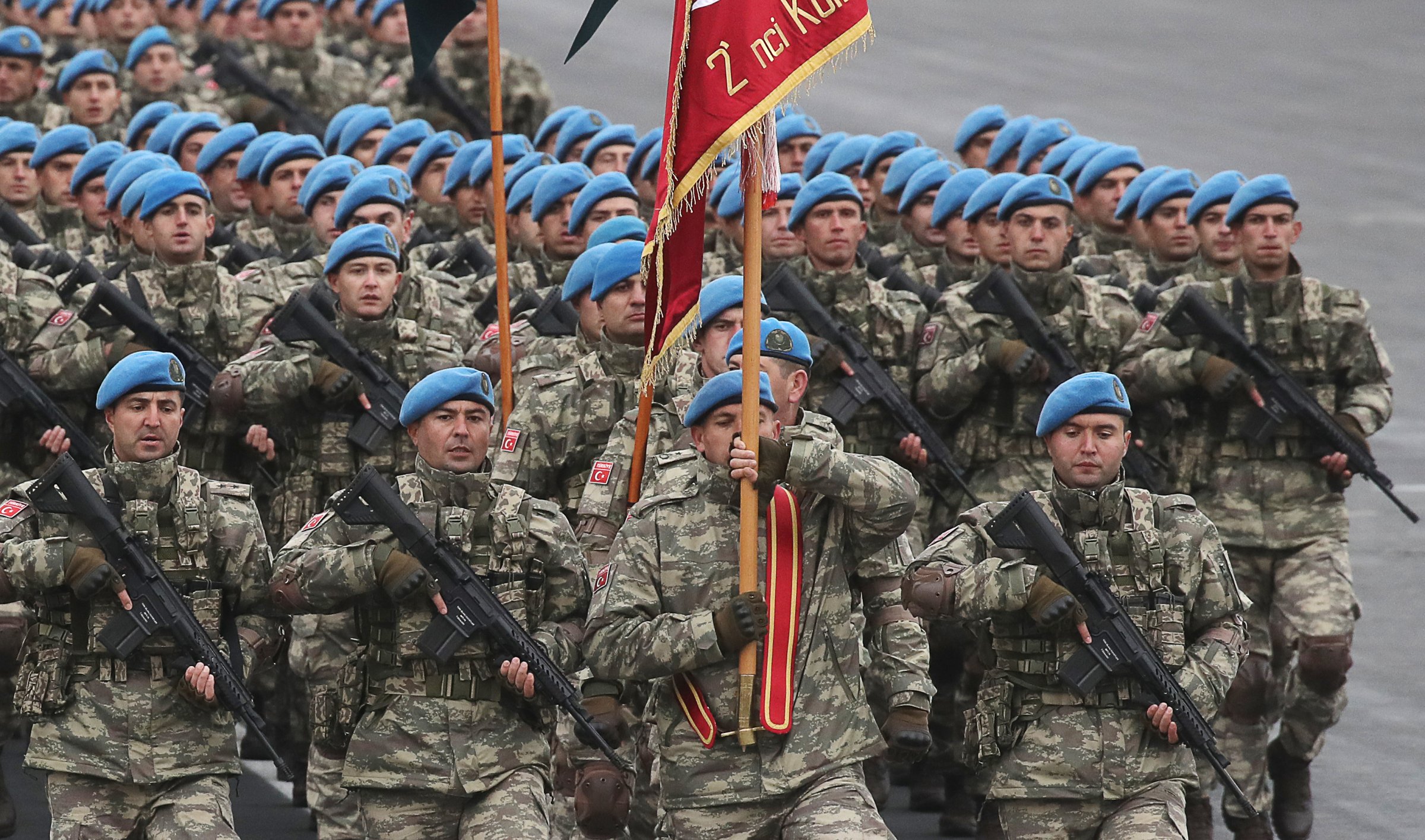
Soldiers fighting for Azerbaijan and Armenia, the two countries involved in the conflict over the disputed territory of Nagorno Karabakh, have committed a litany of war crimes, according to Amnesty International.
The human rights group analyzed 22 videos, shot by unknown onlookers, which they say show civilians being decapitated, corpses being desecrated and prisoners of war abused in the small enclave in the southern Caucasus mountains.
Amnesty International’s Dec. 10 release of the results of the investigation by its Crisis Evidence Lab comes on the same day Turkey’s President Recep Tayyip Erdogan attended a “victory parade” in Baku with Azerbaijan’s President Ilham Aliyev. Armenia and Azerbaijan had resumed fighting Europe’s oldest frozen war on Sept. 27, with Turkey openly backing Azerbaijan. A Russia-brokered ceasefire that ended the fighting on Nov. 9 requires Armenia to withdraw its forces from the breakaway territory, which had been under its de-facto control since 1994.
The agreement came after a string of Azerbaijani victories in the conflict zone and was described by Aliyev as “total capitulation” on the part of the opposing side. Its signing provoked protests in Armenia’s capital Yerevan and calls for Prime Minister Nikol Pashinyan to resign.
Read more: Scenes from Behind the Frontlines of Europe’s Oldest ‘Frozen War’ in Nagorno-Karabakh
The videos analyzed by Amnesty had been shared on private Telegram accounts and groups within the last three weeks and depicted apparent war crimes committed on both sides in the conflict. “Members of the military on both sides have behaved horrendously, displaying a complete disregard for the rules of war,” Denis Krivosheev, Amnesty International’s Research Director for Eastern Europe and Central Asia said in a press release describing the videos’ contents. “The depravity and lack of humanity captured in these videos shows the deliberate intention to cause ultimate harm and humiliation to victims, in clear violation of international humanitarian law.”
Among the footage Amnesty analyzed, one video shows a man in an Azerbaijani military uniform decapitating a shirtless Armenian civilian before a clapping crowd. A second video of the same incident shows the head of the victim placed on the nearby carcass of a pig. “This is how we get revenge—by cutting heads,” one of the men in attendance can be heard saying in Azerbaijani, calling the extrajudicial killing an act of revenge for “the blood of our martyrs.”
Another video showed an Armenian-speaking man sticking a knife into the throat of a gagged and bound man wearing an Azerbaijani border patrol uniform. The captive, who was reported dead by Azerbaijani media, would have died within minutes as a result of the stabbing, independent pathologists confirmed to Amnesty.
Krivosheev called on both sides to launch independent investigations into the war crimes and hold the perpetrators accountable. Amnesty says it has authenticated all 22 videos and conducted technical tests that confirm the files have not been manipulated. Azerbaijan’s prosecutor general said on Dec. 8 that his office was investigating allegations of human rights abuses committed by both Armenian and Azerbaijani forces, Britain’s Telegraph reports.
The batch of videos analyzed by Amnesty is only the latest evidence of war crimes to be documented in relation to the South Caucasus conflict. On Oct. 28, Armenian forces either fired or supplied internationally banned cluster bombs for an attack on the Azerbaijani city of Barda, which along with other munitions killed at least 21 civilians according to Human Rights Watch. The monitor says that Azerbaijan repeatedly used banned cluster munitions—which scatter tiny bomblets over a wide area—in residential areas of Nagorno Karabakh.
Armenia, Russia, and France have accused Turkey of sending Syrian mercenaries to fight on behalf of Azerbaijan. Azerbaijan and Turkey deny that accusation, despite considerable photo and video evidence to the contrary, and have alleged that Armenia has employed foreign mercenaries.
The United Nations Human Rights Office has called for the withdrawal of all mercenaries from in and around the Nagorno-Karabakh conflict zone, noting that Azerbaijan is a signatory of the International Convention against the Recruitment, Use, Financing and Training of Mercenaries.
More Must-Reads from TIME
- L.A. Fires Show Reality of 1.5°C of Warming
- Behind the Scenes of The White Lotus Season Three
- How Trump 2.0 Is Already Sowing Confusion
- Bad Bunny On Heartbreak and New Album
- How to Get Better at Doing Things Alone
- We’re Lucky to Have Been Alive in the Age of David Lynch
- The Motivational Trick That Makes You Exercise Harder
- Column: All Those Presidential Pardons Give Mercy a Bad Name
Write to Joseph Hincks at joseph.hincks@time.com